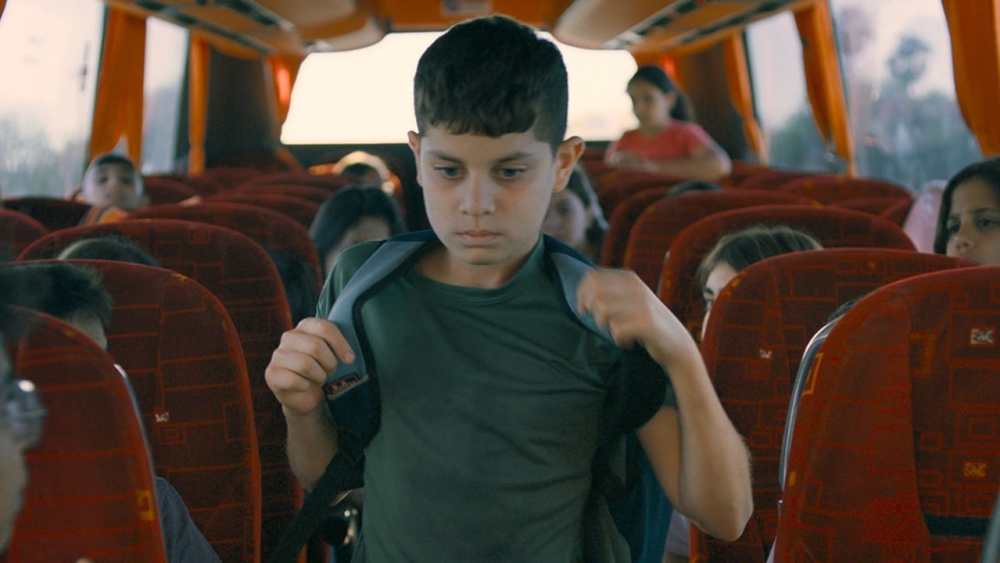“The Sea,” a poignant drama about a Palestinian boy who risks his life to go to the beach for the first time in Tel Aviv, will represent Israel in the international feature race at the Oscars.
The movie, directed by Shai Carmeli Pollak and produced by Baher Agbariya, won best picture at the Ophir Awards, the Israeli equivalent to the Oscars, which qualifies the movie to be the country’s official submission. The movie also won best screenplay, best actor for the 13-year old Palestinian star Muhammad Gazawi, best supporting actor for Khalifa Natour and best original score.
The Ophir Awards are voted on by the Israeli Academy of Film and Television — which brings together nearly 1,100 filmmakers, producers and actors. The evening was emotionally charged and took a political turn as nearly every winner on stage was sporting a black t-shirt with anti-war message such as “a child is a child” in Hebrew and Arabic, and “End the War,” while others had pictures of the hostages.
Upon accepting the award on stage, Agbarian said: “I thank the Academy on behalf of the entire crew of the film ‘The Sea‘ for this trust – this is not taken for granted in such dark days when the sounds of war and the noise of weapons try to silence the human voice.”
“This film was born from love for humanity and cinema, and its message is one – the right of every child to live and dream in peace, without siege, without fear, and without war,” he said. “This is a basic right that we will not give up on; we are all equal. I dedicate this award to all who believe that equality and peace is not an illusion but a human choice here and now.” Agbarian, who is Palestinian, also thanked the Israeli Film Fund for supporting the film.
Gazawi, the young star of “The Sea” which marked his first acting role, said in his acceptance speech that he wishes “for all children to live and dream without wars.”
Assaf Amir, the Israeli Film Academy chairman, said “The Academy congratulates director Shai Carmeli Pollak and producer Baher Agbariya for this powerful and moving work. Israeli cinema once again demonstrates its relevance and ability to respond to complex and painful realities.”
“This is a film full of empathy — for all human beings, and especially for its protagonist, a Palestinian child whose only dream is to see the sea,” said Amir, adding that “Israeli cinema, once again, proves itself relevant and responsive to a painful and complex reality.”
Shot in Arabic and Hebrew, “The Sea” is “a sensitive and empathetic film — toward humanity in general, and toward its protagonist in particular,” said Amir.
Also a film producer with credits including “Chazarot” and “Blue Box,” Amir highlighted the symbolic meaning of “The Sea’s” selection amid the war in Gaza which has been raging for nearly two years following the deadly Hamas terror attack in southern Israel on Oct. 7; and repeated attacks from the Israeli government on the left-leaning film industry, which is also being weakened by boycott calls. Just last week, nearly 4,000 entertainment industry names, including Hollywood stars like Emma Stone and Joaquin Phoenix, signed a petition calling for a boycott of Israeli film institutions “complicit in war crimes” in Gaza. And earlier this week, at the Emmy Awards, Javier Bardem called for a “commercial and diplomatic blockade and sanctions on Israel.”
“In the harsh reality we live in, as the never-ending war in Gaza takes a terrible toll in death and destruction, the ability to see the ‘other,’ even if he is not of your own people, gives me small hope,” Amir said. “In the face of the Israeli government’s attacks on Israeli cinema and culture, and the calls from parts of the international film community to boycott us, the selection of ‘The Sea’ is a powerful and resounding response.”
Amir also applauded the fact that the “The Sea,” like many films produced in Israel, is an “Arabic-language film, born of collaboration between Jewish and Palestinian Israelis.”
“The Sea” was one of several anti-war films in the running at the Ophir Awards, alongside Nadav Lapid‘s “Yes” and Netalie’s “Oxygen” — all of which were financed with the help of the Israel Film Fund.
Director Uri Barbash received a lifetime achievement prize at the Ophir Awards and took the opportunity to plead for the country to “replace the regime that declared war on Israeli society”.
“We will create, all together, Jews and Arabs, religious and secular. All together we will eradicate evil from our beloved land. The sanctity of life, the protection of life and the image of the human person must not have ethnic or geographical boundaries,” Barbash said. “It is our sacred duty to return all the kidnapped to the bosom of their families, and immediately, to end the damned war and replace the ‘divide and rule’ regime that declared war on Israeli society,” he continued.
The best documentary feature award went to director Tom Shoval for his film “ A Letter to David”
about David Cunio who starred in his debut film “Youth” and was abducted by Hamas from Kibbutz
Nir Oz on Oct. 7, 2023.
Shoval, who was wearing a black T shirt with photos of David and Ariel, said on stage that “This film remains unfinished, and can only be completed with all the hostages return.”
“We live in an abyss we try to walk and see in the darkness and we all know this is impossible. I have learned that life is the most import thing. The value of human life, any human is sacred, and humanity is human when it sees other humans; saving, protecting, nurturing,” Shoval continued.

